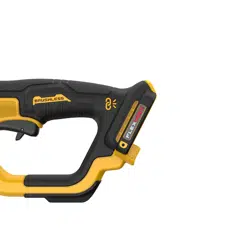Loading ...
Loading ...
Loading ...

9
ENGLISH
The label on your tool may include the following symbols. The
symbols and their definitions are asfollows:
V ......................... volts
Hz .......................hertz
min ..................... minutes
or DC ......direct current
...................... Class I Construction
(grounded)
…/min ..............per minute
BPM .................... beats per minute
IPM ..................... impacts per minute
OPM ....................
oscillations per minute
RPM ....................
revolutions per minute
sfpm ...................
surface feet per minute
SPM .................... strokes per minute
A ......................... amperes
W ........................watts
Wh ......................watt hours
Ah ....................... amp hours
or AC ...........alternating current
or AC/DC .... alternating or direct
current
...................... Class II Construction
(double insulated)
n
o
.......................no load speed
n .........................rated speed
PSI.......................
pounds per square inch
......................earthing terminal
.....................safety alert symbol
..................... visible radiation–
do not stare into
the light
..................... wear respiratory
protection
..................... wear eye protection
..................... wear hearing
protection
..................... r
ead all documentation
.....................
do not expose to rain
..................... do not use the
guard for
cut-off operations
at least 21mm. Failure to use an accessory with the
appropriate thread depth could result in damage to the
hubbed wheel and injury to the operator or persons in
thearea.
• The arbor size of hubbed wheels, flanges, backing
pads or any other accessory must properly fit the
spindle of the power tool. Accessories with arbor holes
that do not match the mounting hardware of the power
tool will run out of balance, vibrate excessively and may
cause loss ofcontrol.
• Avoid bouncing the wheel or giving it rough
treatment. If this occurs, stop the tool and inspect the
wheel for cracks orflaws.
• Always handle and store wheels in a carefulmanner.
• Do not operate this tool for long periods of time.
Vibration caused by the operating action of this tool may
cause permanent injury to fingers, hands, and arms. Use
gloves to provide extra cushion, take frequent rest periods,
and limit daily time ofuse.
• Safety goggles or safety glasses with side shields and
a full face shield compliant with ANSI Z87.1 MUST be
worn by the operator and others that are within 50'
(15.2 m) of the use of thisproduct.
• Air vents often cover moving parts and should be
avoided. Loose clothes, jewelry or long hair can be caught
in movingparts.
CAUTION: When not in use, place tool on its side
on a stable surface where it will not cause a
tripping or falling hazard. Some tools with large
battery packs will stand upright on the battery pack
but may be easily knockedover.
Additional Safety Information
WARNING: Never modify the power tool or any part of
it. Damage or personal injury couldresult.
WARNING: ALWAYS use safety glasses. Everyday
eyeglasses are NOT safety glasses. Also use face or
dust mask if cutting operation is dusty. ALWAYS WEAR
CERTIFIED SAFETYEQUIPMENT:
• ANSI Z87.1 eye protection (CAN/CSA Z94.3),
• ANSI S12.6 (S3.19) hearing protection,
• NIOSH/OSHA/MSHA respiratoryprotection.
WARNING:
Some dust created by power sanding,
sawing, grinding, drilling, and other construction
activities contains chemicals known to the State
of California to cause cancer, birth defects or
other reproductive harm. Some examples of these
chemicalsare:
• lead from lead‑based paints,
• crystalline silica from bricks and cement and other
masonry products, and
• arsenic and chromium from
chemically‑treatedlumber.
Your risk from these exposures varies, depending on
how often you do this type of work. To reduce your
exposure to these chemicals: work in a well ventilated
area, and work with approved safety equipment, such
as those dust masks that are specially designed to filter
out microscopicparticles.
WARNING: Use of this tool can generate and/or
disperse dust, which may cause serious and permanent
respiratory or other injury. Always use NIOSH/OSHA
approved respiratory protection appropriate for
the dust exposure. Direct particles away from face
andbody.
WARNING: Always wear proper personal hearing
protection that conforms to ANSI S12.6 (S3.19)
during use. Under some conditions and duration
of use, noise from this product may contribute to
hearingloss.
• Wear protective clothing and wash exposed areas
with soap and water. Allowing dust to get into your
mouth, eyes, or lay on the skin may promote absorption
of harmfulchemicals. Direct particles away from face
andbody.
• Use the appropriate dust extractor vacuum to remove
the vast majority of static and airborne dust. Failure
to remove static and airborne dust could contaminate the
working environment or pose an increased health risk to
the operator and those in closeproximity.
• Use clamps or other practical ways to secure and
support the workpiece to a stable platform. Holding
the work by hand or against your body is unstable and may
lead to loss ofcontrol andinjury.
• Always use auxiliary handle. Tighten the handle
securely. The auxiliary handle should always be used to
maintain control of the tool at alltimes.
• To prevent the spindle end from contacting the
bottom of the hole of the hubbed wheel, use
accessories that have a threaded hole depth of
Loading ...
Loading ...
Loading ...
